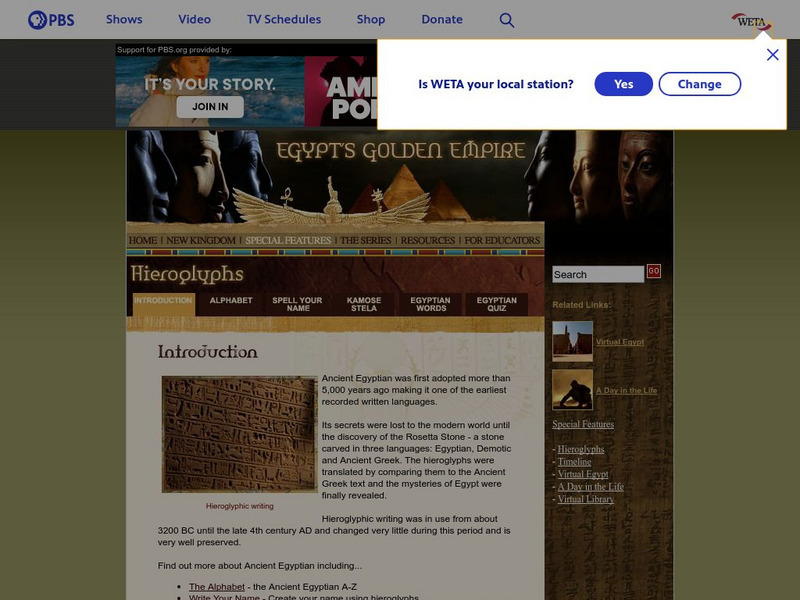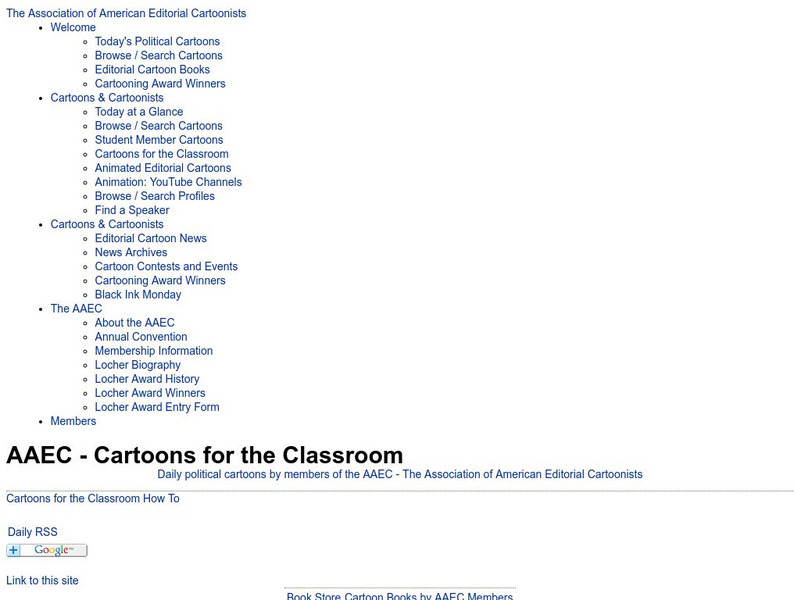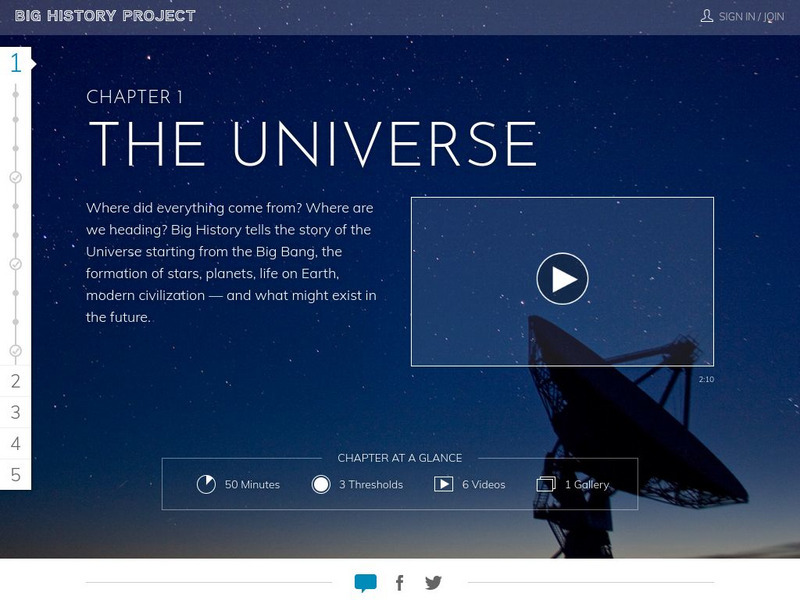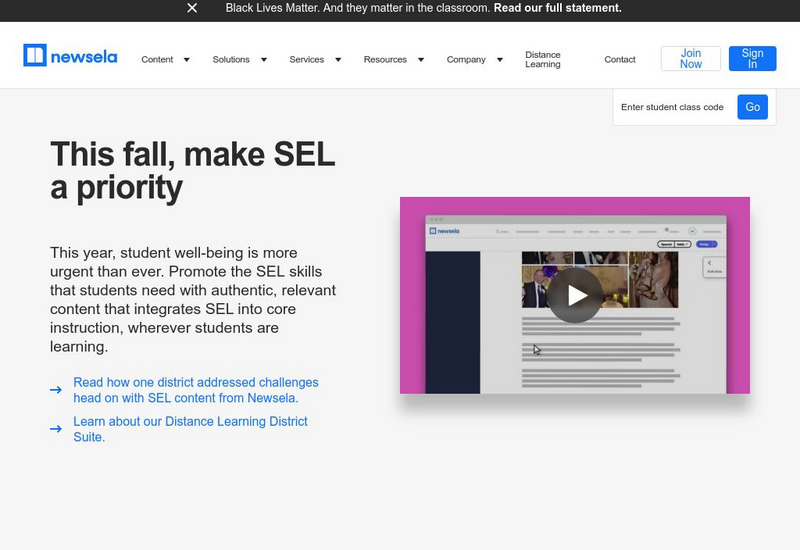Hi, what do you want to do?
Internet History Sourcebooks Project
Fordham University: Medieval Sourcebook: History Through Primary Sources
This site from the Medieval Sourcebook answers the question: Why Study History Through Primary Sources? It provides complete information, a list of review questions, and bibliography information.
HyperHistory Online
Hyper History Online
HyperHistory Online houses a collection of timelines that graphically displays 3,000 years of world history. Uses charts, images, maps, and color-coded text to reinforce the relationships among important persons and significant events in...
University of Chicago
University of Chicago Library: Teaching the Middle East: Writing: Islamic Period
Learning module considers the literature of the Middle East after the arrival of Islam. Discusses the development of the Koran and a variety of poetic forms.
Smithsonian Institution
Smithsonian Education: Artifact & Analysis: Historical Interpretation
A companion to American history courses, Artifact & Analysis features historical artifacts and documents about consumerism and the nation expanding, teacher's guide, writing assignments, and essays.
University of Calgary
Ithaca College: Project Look Sharp: Media Construction of War
Provides a multi-unit curriculum kit relating to the study of war that incorporates media literacy. All material is free to download and includes teacher guides, student handouts, historical documents, slideshows, and more.
Polk Brothers Foundation Center for Urban Education at DePaul University
Depaul University: Center for Urban Education: Nonfiction Passage Questions[pdf]
This site contains questions for each passage are provided. Graphic organizers are available for these copyrighted materials that may be used for educational purposes.
Polk Brothers Foundation Center for Urban Education at DePaul University
De Paul University: Center for Urban Education: How Does Writer Organize Nonfiction Text?[pdf]
This poster contains writing craft questions for students to ask when reading nonfiction. This graphic organizer is a copyrighted material that may be used for educational purposes.
Polk Brothers Foundation Center for Urban Education at DePaul University
De Paul University: Center for Urban Education: Nonfict Readers Analyze Structure/views[pdf]
This graphic organizer contains questions for students as they analyze any nonfiction text. Students will read closely to determine the text's structure, viewpoint, and tone. This graphic organizer is a copyrighted material that may be...
PBS
Pbs Teachers: Egypt's Golden Empire: Hieroglyphs
Learn to write your name in hieroglyphs on this PBS site that explains hieroglyphic writing and the sounds of the hieroglyphs. Click on Kamose Stela to see and read the translation of hieroglyphic text.
Newspapers in Education
Ni Eonline: Cartoons for the Classroom: Lessons Library
Newspapers in Education and the Association of American Editorial Cartoonists publish simple, inventive lesson plans and ideas for classes in editorial cartooning, caption writing, and news analysis. Lessons include "cartoon blanks" that...
Other
Best Evidence Encyclopedia: Middle and High School Reading
Looking for opportunities to improve your readers or to help your readers get ahead? BEE presents a number of programs that have been evaluated by their researchers to bring educators the best programs on the market. Learn about programs...
Other
Online Historical Fencing Manuals & Texts
Links to historical fighting manuals and analysis of these manuals. Intriguing reading for those with an interest in Renaissance fighting techniques.
Other
Houston Independent School District: Social Studies Strategies [Pdf]
Hone in on methods for historical thinking and the process of historical inquiry when studying social studies.
ReadWriteThink
Read Write Think: Read Write Think
ReadWriteThink offers hundreds of classroom resources for teaching and learning language arts and literacy. Resources range from lesson plans to student interactives, to after-school activities, and professional development.
ReadWriteThink
Read Write Think: Expository Escapade: Detective's Handbook
Working on higher-level thinking skills with your readers is made easier with this lesson. You will have your students connect with and analyze a mystery story at their grade-appropriate level. Lesson plan, printable worksheets, and...
George Mason University
George Mason University: Writing Across the Curriculum: Teaching With Writing
Find a rationale, practices and strategies, and resources for incorporating writing in all areas of the curriculum. Learn how to write clear assignments and some methods to make grading of writing more efficient and effective....
Polk Brothers Foundation Center for Urban Education at DePaul University
Depaul University: Center for Urban Education: Guide Nonfiction Reading
This site contains 17 nonfiction articles that are appropriate for students with a 6th grade reading level, as measured by the Fry Formula. Questions for each passage are provided. These graphic organizers are copyrighted and may be used...
Polk Brothers Foundation Center for Urban Education at DePaul University
Depaul University: Center for Urban Education: Guide/assess Nonfiction Reading
This site contains 47 one-page guided writing and reading guides and assessments.The reproducibles are copyrighted materials but may be copied and used for educational purposes.
Other
Literature of India: Indian Writing in English
This site looks at Indian literature in English. Tracing the beginning of Indian literature from the 18th century this site analyses key literary figures up to present day.
Other
Big History Project: Chapter 1: The Universe
Chapter 1 of Big History Project, learning module introduces history from the origins of the Universe. Site contains adaptable classroom material geared toward middle and high school students, including informational text, engaging...
Annenberg Foundation
Annenberg Learner: American Passages: A Literary Survey: Archive
This search engine provides access to more than 3000 items including visual art, audio files, primary source materials, and additional texts supporting and enriching the understanding of American Literature. RI.9-10.9 US Documents,...
Other
Newsela
[Free Registration/Login Required] Newsela offers new current events articles daily in areas ranging from the arts to war and peace. Each article is available at five different reading levels; grade level and word count are displayed for...
Georgia Department of Education
Ga Virtual Learning: World History: The Middle Ages
Learning module in World History on the Middle Ages. Complete set of resources including interactive, multi-media assignments, activities and assessment.
Georgia Department of Education
Ga Virtual Learning: Introduction to Ap Government and Politics Comparative
Learning module introduction to AP Government and Politics is a comparative course study on trends, research and types of political sytems throughout the world. Includes all necessary materials for comprehensive study and enrichment.





















